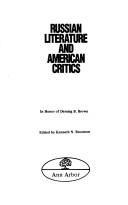| Listing 1 - 6 of 6 |
Sort by
|
Book
ISBN: 9780231552493 Year: 2021 Publisher: New York, NY
Abstract | Keywords | Export | Availability | Bookmark
 Loading...
Loading...Choose an application
- Reference Manager
- EndNote
- RefWorks (Direct export to RefWorks)
Book
ISBN: 0231552491 Year: 2021 Publisher: New York : Columbia University Press,
Abstract | Keywords | Export | Availability | Bookmark
 Loading...
Loading...Choose an application
- Reference Manager
- EndNote
- RefWorks (Direct export to RefWorks)
Archpriest Avvakum's autobiography is a record of his life, ecclesiastical career, painful exile, religious persecution, and imprisonment, written in the 1660s and '70s from a cell in an Arctic village where the archpriest had been imprisoned by the tsar.
Clergy --- Old Believers --- Avvakum Petrovich,

ISBN: 0930042581 Year: 1984 Publisher: Ann Arbor University of Michigan press
Abstract | Keywords | Export | Availability | Bookmark
 Loading...
Loading...Choose an application
- Reference Manager
- EndNote
- RefWorks (Direct export to RefWorks)
Russian literature --- History and criticism --- Brown, Deming,
Book
ISBN: 0292704127 Year: 1990 Publisher: Austin University of Texas press
Abstract | Keywords | Export | Availability | Bookmark
 Loading...
Loading...Choose an application
- Reference Manager
- EndNote
- RefWorks (Direct export to RefWorks)
82.0 --- 82:1 --- 82.01 --- 82.01 Esthetica --- Esthetica --- 82:1 Literatuur en filosofie --- Literatuur en filosofie --- 82.0 Literatuurtheorie --- Literatuurtheorie --- Literature --- Philosophy. --- Aesthetics --- Philosophy --- Mental philosophy --- Humanities --- Literature and philosophy --- Philosophy and literature --- Beautiful, The --- Beauty --- Esthetics --- Taste (Aesthetics) --- Art --- Criticism --- Proportion --- Symmetry --- Theory --- Psychology --- Radio broadcasting Aesthetics
Book
ISBN: 9780292792135 Year: 2021 Publisher: Austin
Abstract | Keywords | Export | Availability | Bookmark
 Loading...
Loading...Choose an application
- Reference Manager
- EndNote
- RefWorks (Direct export to RefWorks)
Book
ISBN: 9780292704121 Year: 1990 Publisher: Austin : University of Texas Press,
Abstract | Keywords | Export | Availability | Bookmark
 Loading...
Loading...Choose an application
- Reference Manager
- EndNote
- RefWorks (Direct export to RefWorks)
Mikhail Bakhtin (1895-1975) is one of the preeminent figures in twentieth-century philosophical thought. Art and Answerability contains three of his early essays from the years following the Russian Revolution, when Bakhtin and other intellectuals eagerly participated in the debates, lectures, demonstrations, and manifesto writing of the period. Because they predate works that have already been translated, these essays—"Art and Answerability," "Author and Hero in Aesthetic Activity," and "The Problem of Content, Material, and Form in Verbal Art"—are essential to a comprehensive understanding of Bakhtin's later works. A superb introduction by Michael Holquist sets out the major themes and concerns of the three essays and identifies their place in the canon of Bakhtin's work and in intellectual history. The introduction, together with Vadim Liapunov's scholarly gloss, makes these essays accessible to students as well as scholars.
| Listing 1 - 6 of 6 |
Sort by
|

 Search
Search Feedback
Feedback About UniCat
About UniCat  Help
Help News
News